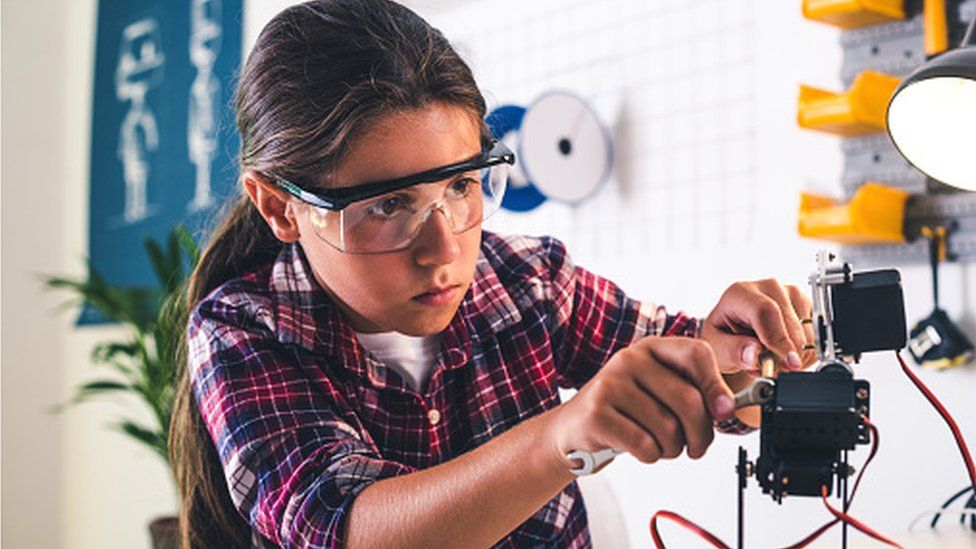Science 'for boys' message putting girls off some careers
- Published

The idea science is "for boys" is driven into girls before they are able to communicate, a Wales-based academic has said.
One in six workers in key science, technology, engineering and mathematics (STEM) sectors is a woman, Welsh Government-commissioned figures show.
Aberystwyth University's Hannah Dee said children spot "tribalism" before they start making their own decisions.
Encouraging more women into STEM is a key priority for the Welsh Government.
In Wales, only 25% of people in ICT are women, compared to 51% in India.
Figures also show 12% of engineering and technology students are female.
The campaign Let Toys Be Toys names companies and shops on social media which categorise by gender - particularly when toys relating to science and industry are automatically placed in the "boy" section.
Dr Dee set up the BCSWomen Lovelace Colloquium, a conference dedicated to encouraging more female students to enter the world of computing and IT.
She said studies had shown attitudes towards girls and boys throughout their lives were "damaging" and girls picked up on such signals before they were capable of making their own decisions.
"The idea girls don't like science because they have less innate talent for science is for me completely laughable," she said.
"It's damaging to girls, girls had lower expectations of themselves and the professions they aspired to were ones which didn't have status or didn't have money.
"But it's damaging to boys too. I think boys - and in fact children - can be really cruel, and boys aren't 'allowed' to do anything caring or they're described as a 'sissy'."
Dr Dee, who works on school initiatives and competitions to get children interested in computers and coding, said once girls are able to make the decision to participate they have often already pigeon-holed themselves by gender.
"One of the worst things is the girls' microscope," she said.
"You can buy a microscope 'for girls' but it will have half the magnification of others and I think children are really good at spotting 'in group' and 'out group' behaviour, they are much more tribal than adults - and adults are pretty tribal.
"So what this does is to say 'yes girls can have a microscope but it doesn't need to be as good'.
"They are very good at spotting what goes in what group and they don't just get it from the parents. However much the parents try there's going to be, as soon as they get to the playground, different pressures."
But senior computer science lecturer Dr Dee said, if there were a clear solution, it would already be in place. However, she said adding more role models was key.
"Code clubs and anything that's voluntary is likely to have a gender bias because, by the time they take clubs, they've already internalised patterns."
Dr Dee, previously named the ninth most-influential woman in UK IT, added despite progress in many fields, children were more polarised now than they had been previously and things were "going backwards".
"I look at the clothes and the shoes and the toys, and I had buckets of Lego as a kid. In a house with two sisters, we had dolls coming out of our ears and we had Lego, science, chemistry sets.
"It's devastating that Lego is now seen as for boys, the idea is bizarre, they are blocks."
Skills Minister Julie James said encouraging more women into STEM made "economic sense" and was a key priority for the Welsh Government.
She agreed to establish and chair a high-level women in STEM board which will meet for the first time on 21 September.
A report by the Wise campaign said increasing the number of women in STEM could be worth £2bn to the UK economy - and help to "challenge gender stereotyping, which contributes to occupational segregation".
- Published16 August 2017
- Published13 March 2017
- Published12 April 2017
- Published9 December 2016